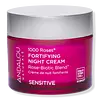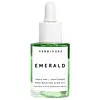What's inside
What's inside
 Key Ingredients
Key Ingredients

 Benefits
Benefits

 Concerns
Concerns

No concerns
 Ingredients Side-by-side
Ingredients Side-by-side

Aloe Barbadensis Leaf Juice
Skin ConditioningWater
Skin ConditioningCoco-Caprylate
EmollientMyristyl Myristate
EmollientCetearyl Olivate
Sorbitan Olivate
EmulsifyingGlycerin
HumectantCetyl Palmitate
EmollientRosa Damascena Flower Water
MaskingLactococcus Ferment Lysate
Skin ConditioningRosa Centifolia Flower Extract
AstringentRhododendron Ferrugineum Leaf Cell Culture Extract
Skin ConditioningMalus Domestica Fruit Cell Culture Extract
Skin ConditioningVitis Vinifera Fruit Cell Extract
Skin ConditioningAronia Melanocarpa Fruit Extract
Skin ConditioningEuterpe Oleracea Fruit Extract
Lycium Barbarum Fruit Extract
AstringentCamellia Sinensis Extract
AntioxidantHydrolyzed Sodium Hyaluronate
Skin ConditioningAscorbyl Tetraisopalmitate
AntioxidantBisabolol
MaskingHydrolyzed Rice Protein
Skin ConditioningButyrospermum Parkii Butter
Skin ConditioningRosa Canina Fruit Oil
EmollientPunica Granatum Seed Oil
EmollientGardenia Taitensis Flower Extract
Skin ConditioningSqualane
EmollientAllantoin
Skin ConditioningPunica Granatum Fruit Extract
AntioxidantPanthenol
Skin ConditioningSorbitan Palmitate
EmulsifyingTocopherol
AntioxidantHelianthus Annuus Seed Oil
EmollientLecithin
EmollientIsomalt
HumectantPalmitic Acid
EmollientButylene Glycol
HumectantXanthan Gum
EmulsifyingPotassium Sorbate
PreservativeSodium Benzoate
MaskingBenzyl Alcohol
PerfumingDehydroacetic Acid
PreservativeCitric Acid
BufferingLactic Acid
BufferingSodium Chloride
MaskingMica
Cosmetic ColorantTitanium Dioxide
Cosmetic ColorantParfum
MaskingPelargonium Graveolens Flower Oil
MaskingGeraniol
PerfumingLinalool
PerfumingLimonene
PerfumingCitronellol
PerfumingAloe Barbadensis Leaf Juice, Water, Coco-Caprylate, Myristyl Myristate, Cetearyl Olivate, Sorbitan Olivate, Glycerin, Cetyl Palmitate, Rosa Damascena Flower Water, Lactococcus Ferment Lysate, Rosa Centifolia Flower Extract, Rhododendron Ferrugineum Leaf Cell Culture Extract, Malus Domestica Fruit Cell Culture Extract, Vitis Vinifera Fruit Cell Extract, Aronia Melanocarpa Fruit Extract, Euterpe Oleracea Fruit Extract, Lycium Barbarum Fruit Extract, Camellia Sinensis Extract, Hydrolyzed Sodium Hyaluronate, Ascorbyl Tetraisopalmitate, Bisabolol, Hydrolyzed Rice Protein, Butyrospermum Parkii Butter, Rosa Canina Fruit Oil, Punica Granatum Seed Oil, Gardenia Taitensis Flower Extract, Squalane, Allantoin, Punica Granatum Fruit Extract, Panthenol, Sorbitan Palmitate, Tocopherol, Helianthus Annuus Seed Oil, Lecithin, Isomalt, Palmitic Acid, Butylene Glycol, Xanthan Gum, Potassium Sorbate, Sodium Benzoate, Benzyl Alcohol, Dehydroacetic Acid, Citric Acid, Lactic Acid, Sodium Chloride, Mica, Titanium Dioxide, Parfum, Pelargonium Graveolens Flower Oil, Geraniol, Linalool, Limonene, Citronellol
Squalane
EmollientLimnanthes Alba Seed Oil
Skin ConditioningCannabis Sativa Seed Oil
EmollientCaprylic/Capric Triglyceride
MaskingWithania Somnifera Root Extract
Skin ConditioningHelianthus Annuus Seed Oil
EmollientLentinus Edodes Extract
Skin ConditioningBorago Officinalis Ethyl Ester
Skin ConditioningCannabidiol - Synthetically Produced
AntioxidantTocopheryl Acetate
AntioxidantHelichrysum Stoechas Flower Extract
PerfumingCannabis Sativa Seed Extract
EmollientMelia Azadirachta Leaf Extract
Skin ConditioningMelia Azadirachta Flower Extract
Skin ConditioningAmino Esters-1
Skin ConditioningCoccinia Indica Fruit Extract
Skin ConditioningSolanum Melongena Fruit Extract
Skin ConditioningAloe Barbadensis Flower Extract
EmollientOcimum Sanctum Leaf Extract
Skin ConditioningOcimum Basilicum Flower/Leaf Extract
TonicCurcuma Longa Root Extract
MaskingCorallina Officinalis Extract
Skin ConditioningSqualane, Limnanthes Alba Seed Oil, Cannabis Sativa Seed Oil, Caprylic/Capric Triglyceride, Withania Somnifera Root Extract, Helianthus Annuus Seed Oil, Lentinus Edodes Extract, Borago Officinalis Ethyl Ester, Cannabidiol - Synthetically Produced, Tocopheryl Acetate, Helichrysum Stoechas Flower Extract, Cannabis Sativa Seed Extract, Melia Azadirachta Leaf Extract, Melia Azadirachta Flower Extract, Amino Esters-1, Coccinia Indica Fruit Extract, Solanum Melongena Fruit Extract, Aloe Barbadensis Flower Extract, Ocimum Sanctum Leaf Extract, Ocimum Basilicum Flower/Leaf Extract, Curcuma Longa Root Extract, Corallina Officinalis Extract
 Reviews
Reviews

Ingredients Explained
These ingredients are found in both products.
Ingredients higher up in an ingredient list are typically present in a larger amount.
Helianthus Annuus Seed Oil is the oil derived from the seeds of a Sunflower. Sunflower seed oil is non-fragrant. It is an emollient, meaning it helps to soften the skin.
Sunflower seed oil contains many fatty acids. The fatty acids found in sunflower seeds include (from highest amount to least): linoleic acid, myristic acid, palmitic acid, stearic acid, arachidic acid, oleic acid, and linolenic acid.
These fatty acids help the skin create ceramides. Ceramides play a role in repairing the skin barrier.
Helianthus Annuus Seed Oil helps moisturize the skin. This in turn helps the skin look more rejuvenated and smoother.
Sunflowers are rich in vitamin E.
Historians believe Indigenous cultures of North America domesticated sunflowers before corn. Thus they relied on sunflower oil for a variety of uses. One such use is moisturizing skin and hair.
Sunflower seed oil may not be fungal acne safe. We recommend speaking with a professional if you have any concerns.
Learn more about Helianthus Annuus Seed OilSqualane is an emollient that helps the skin hold onto moisture. It's an oily liquid that occurs naturally in certain types of fish and plant oils.
Because squalane boosts hydration in the skin, it also comes with plenty of benefits: it is an antioxidant and can help fight free radicals and skin damage. Squalane is also found to have a detoxifying effect when applied.
Squalane comes from squalene, which occurs naturally within the sebum of our skin. It is one of the oils our skin produces to keep itself hydrated. Squalane is the hydrogenated version of squalene and has a longer shelf life.
Research shows that squalane is non-irritating (even at 100% concentration).
In general, it's a fantastic ingredient. It does a great job at hydrating the skin, and it's suitable for those with sensitive skin.
The source of squalane may impact malassezia / fungal acne. This is because olive oil derived squalane can contain impurities such as fatty acids and plant waxes. Sugarcane derived squalane is recommended for anyone with malassezia concerns.
Is squalane vegan?
This depends on the source. Squalane can be derived from both plants and animals. Most squalane used in skincare comes from plants.
Please note: the source of squalane is only known if disclosed by the brand. We recommend reaching out to the brand if you have any questions about their squalane.
Read more about squalene with an "e".
Is squalane an oil?
Squalane is often called an oil, but it’s technically not; it’s a hydrocarbon, meaning it’s only made of carbon and hydrogen, unlike true oils which are triglycerides made of fatty acids and glycerol.
The term “oil-free” isn’t regulated, so companies can define it however they want. Some exclude all oils, while others just avoid mineral oil or comedogenic oils.
While some people avoid oils thinking they cause breakouts, the right kind of oil (or oil-like ingredient like squalane) can actually help balance and hydrate your skin. It’s worth testing out simple oils or squalane to see what works best for your skin.
Learn more about Squalane